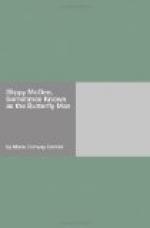It was this last aspect of the boy’s character that amazed and interested John Flint, who was himself too shrewd not to divine the sincerity, even the commonsense, of what Laurence called “applied Christianity.” Altruism—and Slippy McGee! He listened with a puzzled wonder.
“I wish,” he grumbled to Laurence, “that you’d come off the roof. It gives a fellow stiff neck rubbering up at you!”
“I’d rather stay up—the air’s better, and you can see so much farther,” said Laurence. And he added hospitably: “There’s plenty of room—come on up, yourself!”
“With one leg?” sarcastically.
“And two eyes,” said the boy. “Come on up—the sky’s fine!” And he laughed into the half-suspicious face.
The gimlet eyes bored into him, and the frank and truthful eyes met them unabashed, unwavering, with a something in them which made the other blink.
“When I got pitched into this burg,” said the lame man thoughtfully, “I landed all there—except a leg, but I never carried my brains in my legs. I hadn’t got any bats in my belfry. But I’m getting ’em. I’m getting ’em so bad that when I hear some folks talk bughouse these days it pretty near listens like good sense to me. Why, kid, I’m nut enough now to dangle over the edge of believing you know what you’re talking about!”
“Fall over: I know I know what I’m talking about,” said Laurence magnificently.
“I’m double-crossed,” said John Flint, soberly and sadly, “Anyway I look at it—” he swept the horizon with a wide-flung gesture, “it’s bugs for mine. I began by grannying bugs for him,” he tossed his head bull-like in my direction, “and I stand around swallowing hot air from you—” He glared at Laurence, “and what’s the result? Why, that I’ve got bugs in the bean, that’s what! Think of me licking an all-day sucker a kid dopes out! Me! Oh, he—venly saints!” he gulped. “Ain’t I the nut, though?”
“Well, supposing?” said Laurence, laughing. “Buck up! You could be a bad egg instead of a good nut, you know!”
John Flint’s eyes slitted, then widened; his mouth followed suit almost automatically. He looked at me.
“Can you beat it?” he wondered.
“Beating a bad egg would be a waste of time I wouldn’t be guilty of,” said I amusedly. “But I hope to live to see the good nut grow into a fine tree.”
“Do your damnedest—excuse me, parson!” said he contritely. “I mean, don’t stop for a little thing like me!”
Laurence leaned forward. “Man,” said he, impressively, “he won’t have to! You’ll be marking time and keeping step with him yourself before you know it!”
“Huh!” said John Flint, non-committally.
Laurence came to spend his last evening at home with us.
“Padre,” said he, when we walked up and down in the garden, after an old custom, after dinner, “do you really know what I mean to do when I’ve finished college and start out on my own hook?”




